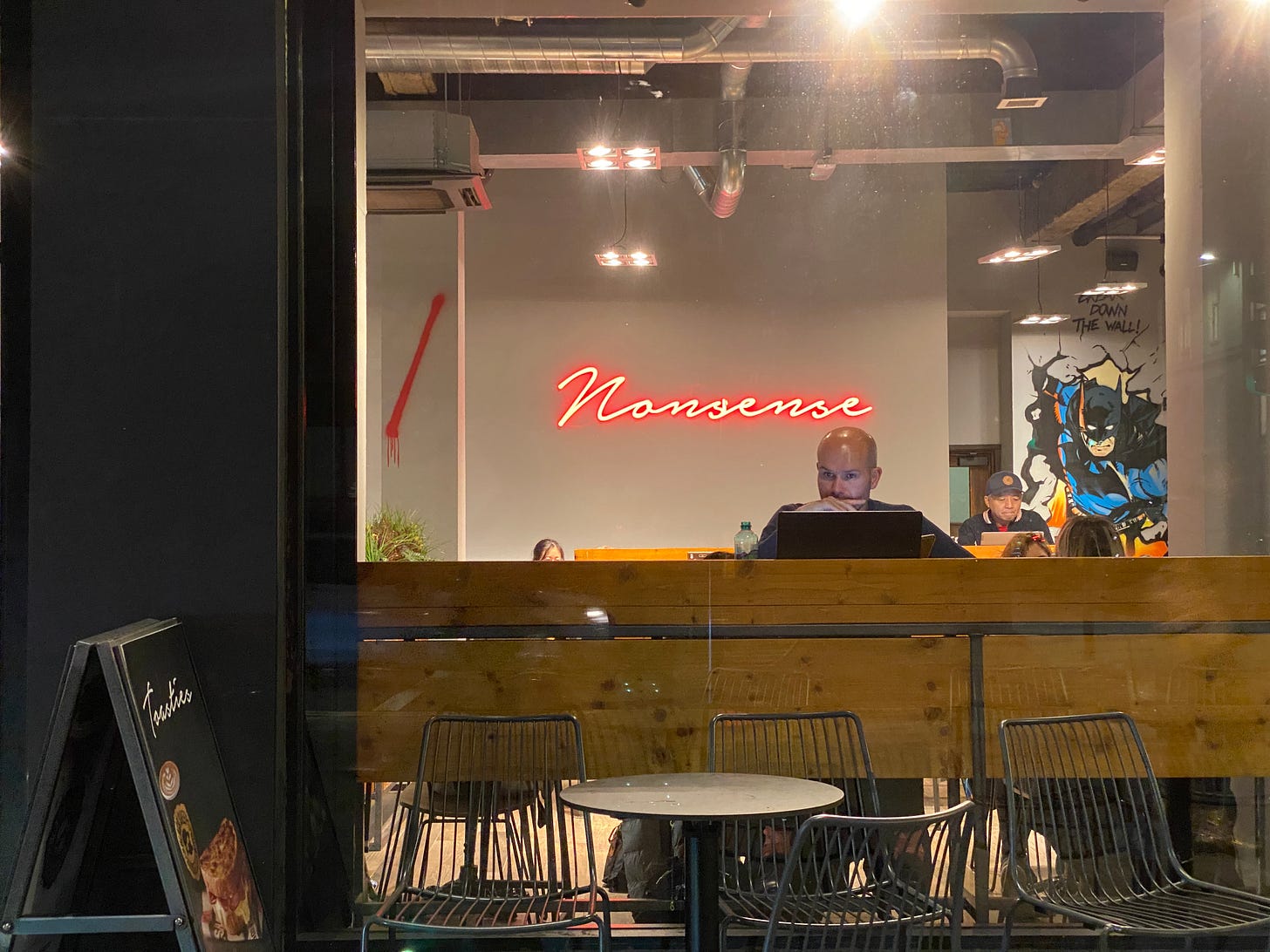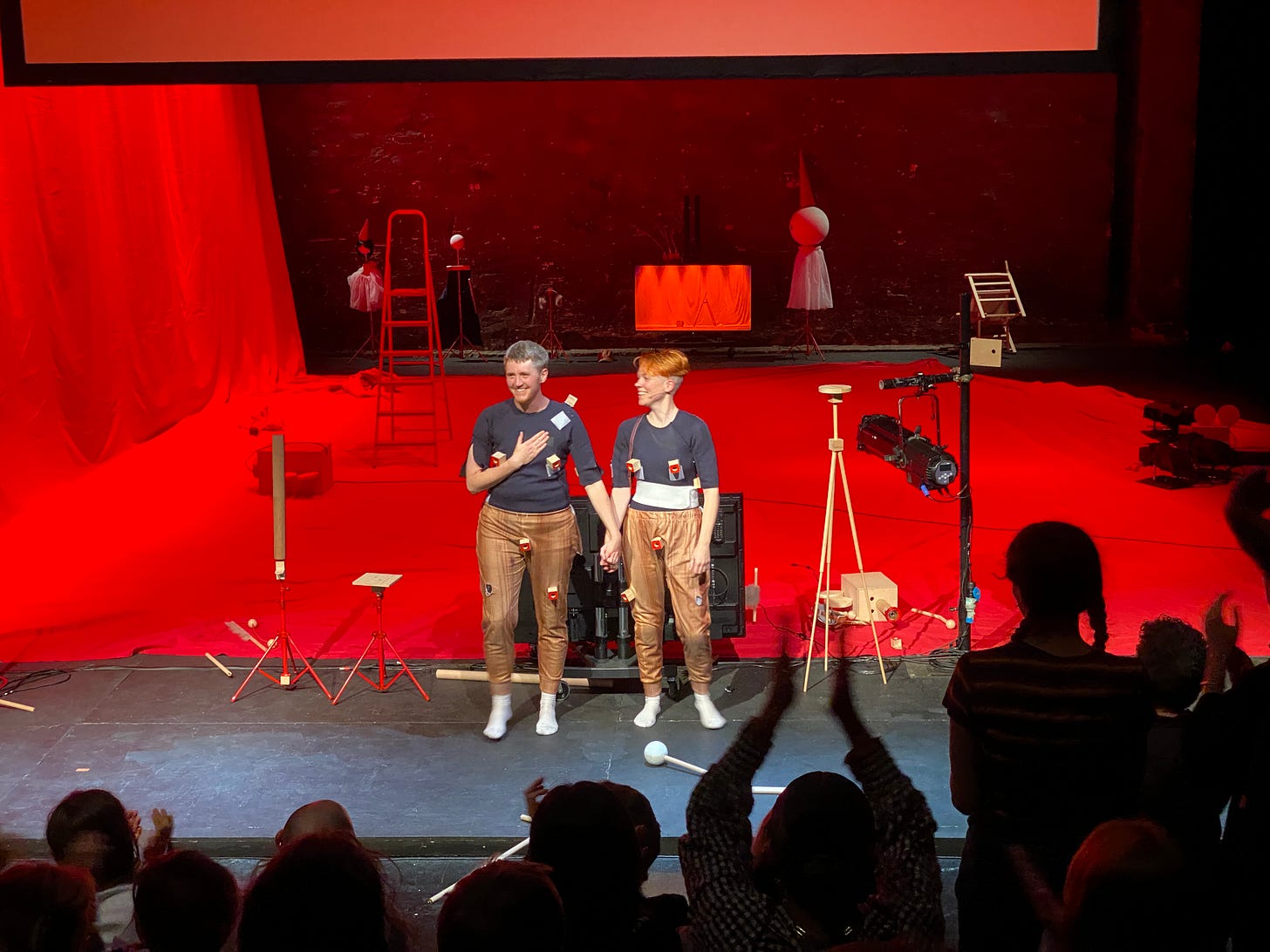There's a funny moment in Martin Amis's The Information that describes a character whose affectation is examining objects with “rapt and childlike curiosity […] as if he’d never seen it before.” This ends “after a certain grapefruit, responding to Gwyn’s rapt and childlike prod with the tined spoon, squirted him in the eye.”1
We would now recognise this affectation as mindfulness or what Shunryu Suzuki called “beginners mind”, a present moment awareness without preconceptions, the kind of naïve openness that helps reduce cynicism. I am a big fan of that vertiginous sense of experiencing something for the first time. In particular, I love the revelatory feeling you get, as an autodidact, when discovering a topic, even if it is a topic that has been discussed by others for thousands of years.
My latest epiphany is becoming aware of how weird are the containers we use to convey our thoughts and feelings. For instance, across the room from me are hundreds of books, all of which have a similar shape and number of pages. How convenient it is that all the authors have the right number of thoughts to fit them! Or think of the three-minute pop song; how wonderful to end up with a medium that can be classified by how long it takes. How do artists select the appropriate medium? What comes first the form or the content?
How it usually works is that a young person has mimetic desire for an artist's work, spends a few years learning the subtleties of the form, and then builds up enough expertise to channel their thoughts into that form. This is why Anders Ericsson's 10,000 hours idea is so resonant: great artists know their form inside out.
What I find dismaying about social media is how it privileges a certain size of thought,2 usually a couple of sentences and a photo. That, the platforms imply, is enough for anyone. When you add text to Instagram on a phone you can't even access the return key. Paragraphs are permitted but discouraged by design. Instagram created an engaging platform, it would be less addictive if people were writing essays. Double tap and scroll on!
I was thinking about all this while watching Cade & MacAskill's The Making of Pinocchio, their astonishingly good trans-adaptation of the story about a puppet who wants to be a real boy. Both Rosana Cade and Ivor MacAskill are seasoned performers who have been involved in numerous successful shows across the years, but it still impressed me that they could dedicate years of their lives constructing such an intricate, delightful piece of theatre. When I am writing a tweet, posting a photo or even writing here, I sometimes think "what if you channelled this energy into something bigger, more polished, worthier of people's attention?” James Joyce spent sixteen years writing Finnegans Wake, he didn’t sit around posting hot takes.
Of course, there has been many a time when a friend has announced that they are going to write a book, will disappear for months on end, only to emerge with their tail between their legs. They say I am a writer, I have been writing, but there is no book forthcoming. I have observed these friends and their struggles and made the decision to just publish on a regular basis and not worry too much.
Laura and I have been reading George Eliot’s Middlemarch out loud. We are at the point where Dorothea is realising that Casaubon's Key to All Mythologies, the book he has been working for decades, is going to be a boring work of pedantry rather than a pioneering work of genius. When we discussed this moment, I said that Casaubon should have started a Substack to test out his ideas rather than writing an entire encyclopedia. But I'm glad that Cade and MacAskill spent years carving their story into its current form rather than, say, talking about their experience in a vlog. Great art multiplies meaning in the mind, mediocre art is just additive.
As I get to the end of this year-long project, I have been ruminating on what I should do next. I like working to this rhythm, but I wonder whether the size and form of these thoughts are inherent in the medium and if the weekly schedule has become too restrictive. If I spent two weeks writing, would it be twice as good and maybe half as long? A book is a commodity which forces authors to write a number of pages. Likewise, when people go to the theatre they are usually looking to watch at least an hour of entertainment but definitely no more than three. How many times have you read a book which should have been an article or an article that should have been a tweet? People stretch things out because they are contractually obliged to.
For the last six weeks, I have been writing weekly diary entries3 on Instagram. Partly to do something with the photos I take and partly to promote my Substack, but the main reason is that I like connections that take place when you tag other people. It is a small nudge towards what Brian Eno called scenius: the collective genius that emerges when people make connections. Would you rather I condense all these thoughts into one monumental gesamtkunstwerk that takes a decade to produce or just give a weekly update with a few photos? What size of thought do you want to consume and in what form?4
It's curious that Amis should poke fun at the wide-eyed Gwyn because is not that dissimilar to the Martian school of poetry, a genre briefly popular in the late-70s where poets would describe everyday objects as if they were examining them for the first time. Amis's fourth novel, Other People, was his attempt at writing a Martian novel and is written from the perspective of an amnesiac woman.
Apologies to Nicholson Baker for appropriating his title.
In this I have been inspired by Dickon Edwards, who wrote a regular diary from 1997 until 2020 but discontinued it to focus on his PhD. I hadn’t realised until this week that he had updated the diary back in August. Apparently, doing the PhD made him so sensitive to bad writing that it put him off writing anything new himself. And he doesn't want to add anything that isn't polished. However, I think my life would be definitely enhanced by a weekly or monthly update from Dickon, even if it did have the odd rough edge.
In my more spiritual moments, I think of myself as the conduit for the universe to express itself rather than the author of my own thoughts. To extend the metaphor beyond all reason, there are ideas lodged in the world's oesophagus needing the Heimlich manoeuvre of my writing to allow us all to breathe.





Thought provoking, as usual!
Do you feel you've got a book in you, straining to get out?